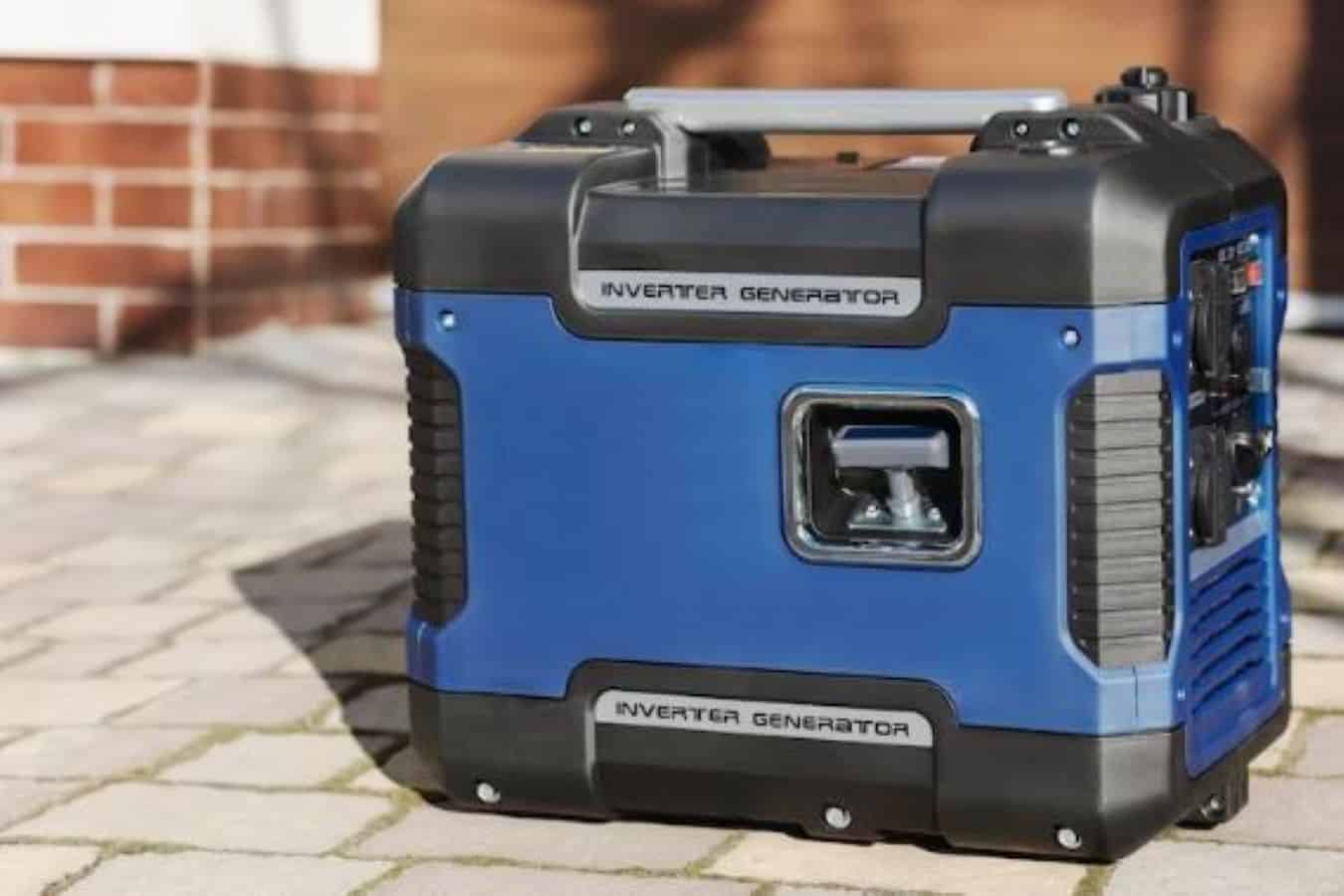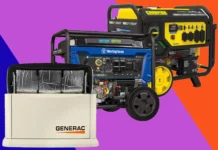Are you looking for an article that best explains the question, What is an Inverter Generator? Then, read on for possible answers.
You’re in the right place. This article will tell you everything you need to know about inverter generators.
However, I’ll explain this article in sections for better understanding.
In the first section, I’ll give you an overview of the inverter generator.
In all honesty, some people don’t even know how an inverter generator works.
That notwithstanding, in the next section, I’ll explain how an inverter generator works.
Moving further, I will highlight some of the pros and cons of an inverter generator.
This will help in choosing the right one that meets your needs.
The next sections contain the features and factors to consider as well as my recommendation in a comparison table.
In the last section, you’ll find my final thoughts.
There, I gave a summary of all that has to do with inverter generators.
So, if you want to get the most from this article, I suggest you read it to the end, and it will help you in no small way.
Without wasting much time, let’s quickly dive into it.
Overview – What Is An Inverter Generator?
The dire need for steady electricity has increased demand in the global market for portable generators.
An inverter generator is a portable generator with an inverter.
Like a regular portable generator, the inverter generator provides electricity to appliances and devices.
It is a portable, quiet, and fuel-efficient generator that is ideal for recreational, home, and emergency use.
It produces clean power with minimal harmonic distortion, making it safe to use with sensitive electronics.
In addition, inverter generators are more lightweight and fuel-efficient than traditional generators.
They are also quieter, more reliable, and easier to maintain than conventional generators.
To be more specific, an inverter generator is a power generator that can convert raw power into a power feed that’s similar to what you’d get from a power line.
Unlike a regular portable generator, an inverter generator’s engine speed adjusts depending on the electrical demand.
This working process reduces noise and fuel consumption dramatically.
The ultimate result of the entire process is a portable generator that is lighter, smaller, and produces ultra-clean power.
In addition, inverter generators usually regulate the power supply to offer steady functioning for delicate electrical gadgets.
Ideally, different inverter generators adopt various strategies to regulate the power they supply.
By doing so, they can reproduce the power that power lines supply.
How Does Inverter Generator Work – What Is An Inverter Generator?
To easily understand how inverter generators work, you first need to understand what an inverter is.
Inverter generators make use of a lightweight digital electronic alternator—the inverter—instead of a hefty alternator like regular generators.
An inverter generator works by converting an incoming DC power source into AC power with the aid of the alternator and inverter.
The alternator first converts the alternating current into a direct current (DC), which is converted back to AC through the inverter.
If you are still getting familiar with what AC and DC mean, I will give you a simple and brief explanation.
Direct current (DC) is the current that flows in only one direction within a circuit.
Most times, DC power is used to charge the batteries.
Meanwhile, alternating current (AC) is the current that changes direction within a circuit.
It is the type of current that is distributed across power lines to homes and businesses.
The steady flow of clean AC power provided by the inverter generator is known as stable pure sine wave delivery.
With inverter generators, you get the power that is as clean as what you get from your home’s main power outlets.
Inverter Vs Generator
Although they both perform the same basic purpose—supplying electricity to devices, there are several differences between inverters and regular generators.
Fuel Efficiency
Unlike regular generators, inverter generators produce enough electricity to meet the required workload.
It can adjust the speed of its engine depending on how much power it needs to supply.
As more power is required, the engine’s speed increases to meet the demand.
Also, the engine operates slower when no power is drawn.
Due to this mode of operation, you will save energy because the machine only uses as much gasoline as is required.
Current
One of the most notable differences between an inverter generator and a regular generator is the kind of electricity that they produce.
Regular generators do not provide “clean” electricity, making them a less suitable option for delicate equipment such as personal gadgets.
However, the continuous sine wave and low harmonic distortion produced by inverter generators are more suitable for sensitive gadgets.
Portability
Inverter generators are very portable. They are much smaller and lighter than regular generators.
Most miniature inverter generators weigh 50 to 60 pounds, and you can easily carry them.
Many also have wheels and a handle that you can use to move them around.
Power
Regular generators provide more power and can reach wattages of 10,000 watts or more.
On the other hand, inverter generators typically have a maximum output of 6,000–7,000 watts.
As a result, regular generators are usually the best option for high-power usage.
Noise
Inverter generators are quieter compared to regular generators.
The reason is that they’re not always running at full throttle.
They also have built-in mufflers and noise-dampening materials for sound insulation.
As a result, their operation is significantly quieter.
Important Factors To Note When Buying An Inverter Generator – What Is An Inverter Generator
Before buying an inverter generator, here are some things you should take into consideration.
Weight and size
You should consider how big and heavy the generator is.
Most times, weight and size largely depend on watt output.
Thankfully, inverter generators all have a very simple and compact design, making them easier to carry about.
Also, they have this “fit in-any-space outlook.
In other words, they don’t require a very large space.
A little comfortable space would suffice.
Noise Level
Even for systems with the same output, noise levels can differ from manufacturer to manufacturer.
Make sure you’re comparing similar products when analyzing noise, especially in terms of how far the unit was situated from the sound-level meter and the workload it was operating on.
Controls
Many inverter generators have controls that allow you to switch from an automated power-saving mode to a power-boost mode when power surges are necessary.
This makes it even easier and less stressful for you, as you won’t have to manually switch to either mode all the time.
Therefore, before rolling out the cash, you should note this properly.
Pros And Cons – What Is An Inverter Generator
Pros
Fuel Efficiency
One of the few things I like about inverter generators is that they consume far less energy than most fuel-powered generators.
In addition, to avoid wasting much fuel, an inverter generator automatically adjusts the engine speed to only what is necessary by the load.
Therefore, an inverter generator helps to save you from the stress of refilling your gas tank every now and then.
Less Noise
To begin with, generators are known for their loud noise, which is often too disturbing.
However, the case is a bit different with inverter generators.
Most, if not all, inverter generators create noise at or below 59 dB, which is almost like the sound of a normal conversation.
Their low-noise ability is due to the fact that they have small engines that run at a slower and more consistent rate.
Additionally, most inverter generators have a noise-reducing design that includes an enclosed casing and built-in mufflers for sound insulation.
This makes them more environmentally friendly than even traditional generators.
Easy Maintenance
Quite unlike their conventional counterparts, inverter generators often require low maintenance.
In fact, the maintenance of an inverter generator is often limited to battery inspection.
You have to carry out the inspection on a monthly basis to ensure that it performs at its very best.
Also, they are usually more powerful and durable than conventional generators.
Therefore, you don’t need to repair or replace them on a regular basis.
Portability
One thing you will definitely like about inverter generators is their portability.
In addition, Inverter generators are usually more lightweight than other types of generators.
Their portability (in terms of size and weight) makes it easier and less stressful for anyone to carry them about.
Some inverter generators come with built-in handles and wheels for easy mobility.
As such, you can use them both at home and for outdoor camping.
Cleaner Power
One thing that differentiates an inverter generator from a regular generator is the kind of electricity it produces.
An inverter generator produces much cleaner energy than conventional generators because it has built-in electronics technology.
This built-in electronics technology assist it to generates a sine wave that produces fewer fuel emissions.
They are safer for sensitive electronics like laptops and cell phones.
Generally, electronics operate better when the electrical output is of higher quality.
As such, this unit’s continuous sine wave and low harmonic distortion are more suitable for sensitive gadgets.
Parallel Operation
Most inverter generators have the capability to run in parallel with other generators.
This helps them meet up in the area of power output.
As I said earlier, inverter generators are not as powerful as regular generators because they don’t generate much output.
However, you can significantly increase the power output by pairing two inverter generators and combining their power.
Although certain models only support this feature, it is more common with inverter generators than with other generator types.
Cons
Here are some of the drawbacks associated with inverter generators.
Cost
For most people, the initial cost is the most significant drawback associated with inverter generators.
On average, inverter generators are significantly more expensive than conventional generators due to their more advanced features.
For instance, they are usually more fuel-efficient and less noisy than other generator types. This alone adds to their huge cost.
However, they are not as expensive as you think.
Although their upfront cost can be a bit discouraging, they provide lots of advantages and are worth it in the long run.
Lower Power Output
To begin with, inverter generators are not as powerful as their conventional counterparts.
In fact, most inverter generators have lower wattages compared to conventional generators.
In most cases, they can be used to power some of your home appliances, RVs, and other outdoor machinery.
However, you can also operate your inverter generator in parallel with a second generator to boost the power output.
They Aren’t For Everyone
In all honesty, I’d say that inverter generators really are not for everyone.
They are primarily designed for people who need something a little more compact, quiet, and efficient.
If your aim for buying an inverter generator is to generate large amounts of power for your home, then I’d really advise you to consider exploring other options.
Mind you, I’m not saying that they don’t generate much power, but not as much as traditional generators.
Following the above, they can only be used to power just a few household appliances.
My Recommendation – What Is An Inverter Generator
| Product Name | Dimensions | Weight | Wattage | Voltage | Power Source | Brand |
| GENMAX Portable Inverter Generator,3300W ultra-quiet gas engine | 18.8″L x 11.4″W x 17.3″H | 47 Pounds | 3300 watts | 120 Volts | Gas powered | GENMAX |
| MaXpeedingrods 3500W Portable Inverter Generator | 18.9″L x 11.4″W x 17.3″H | 47 Pounds | 3500 watts | 120 Volts (AC) | Gas Powered | MaXpeedingrods |
| Champion Power Equipment 200986 4500-Watt Portable Inverter Generator, RV Ready | 23.2″L x 17.7″W x 20.1″H | 95 Pounds | 4500 Watts | 120 Volts | Gas Powered | Champion Power Equipment |
| WEN 56380i Super Quiet 3800-Watt RV-Ready Portable Inverter Generator | 23.2″L x 18″W x 20.1″H | 99.2 Pounds | 3800 Watts | 120 Volts | Gas Powered | WEN |
| Champion Power Equipment 100520 8750-Watt DH Series Open Frame Inverter Generator | 26.6″L x 25.6″W x 23.7″H | 152.7 pounds | 8750 watts | 240 Volts | Gas Powered | Champion Power Equipment |
Frequently Asked Questions – What Is An Inverter Generator
Inverter generators are better than traditional generators as they can run for a long time and still use less energy.
An inverter generator produces a clean and stable AC power supply.
Inverter generators are less noisy, with a noise level of around 59 decibels. That’s much like the sound of a normal conversation.
Yes, an inverter generator can run a refrigerator as long as the generator is of sufficient size to handle the load.
Because it has a technology that first converts the alternating current into a direct current (DC), which is then converted back to AC through the inverter.
Generally, inverter generators can run continuously for 5-10 hours on a single tank of fuel, depending on the load and the size of the tank.
An inverter generator uses unleaded gasoline as its main fuel source.
A typical generator converts mechanical energy into electrical energy. However, an inverter generator, as the name suggests, has an inverter built into it, which allows it to convert mechanical energy into alternating current (AC).
One advantage of an inverter generator is its fuel efficiency. It is designed to adjust its engine speed based on the amount of power being used.
For safety reasons, keeping your inverter generator at least 20 feet from your house is always advisable
My Final Thoughts – What Is An Inverter Generator
As I said earlier, inverter generators are portable generators designed to convert AC power to DC and then back to clean AC power.
They are quieter, more fuel-efficient, and lighter than traditional generators. They also feature fuel-saving modes and can be easily moved around.
An inverter generator can be a very useful asset, especially if, where you live, there is always the occasional blackout.
You can use them to power sensitive devices such as computers, tablets, mobile phones, and other domestic appliances, as they produce a consistent, clean, and stable power output.
Although they may cost a little more than regular generators, they are worth it in the long run.
No matter what your personal needs may be, you should be able to find a good inverter generator that meets your requirements.
Somewhere in this article (if you scroll upward), you’ll find where I made recommendations on the best inverter generators you can buy for your home.
So, all you need to do is choose the one that suits your budget and meets your needs.
I hope you found this article helpful. You can also share your thoughts with us by using the reply form below.
Also, for more reviews, please visit the following pages:
What Is A Dual Inverter Air Conditioner?




